The Complete Guide to Online Dating Sites in Costa Rica
Unlike in many other countries, being an expatriate in Costa Rica does not offer a wide variety of online dating options. Previously, dating sites in … Read more
Costa Rica is the only Latin American democratic country without the need of an army — meaning it’s very peaceful.
But expats relocate here for its nature, diversity, tropical climate, biodiversity, and beaches. All of which add up to a relaxing way of life.
The country is becoming more popular among expats, especially retirees from the United States and Europe.
We’ll walk you through everything you need to know about making Costa Rica your new home.
Contents
The greatest advantage of moving to Costa Rica has a lot to do with the country’s social fabric. Costa Rica is still considered a developing nation. However, the World Economic Forum lists it as one of the happiest and most sustainable countries. Costa Rica earned this label from its:
The country’s motto, “pura vida,” translates to “pure life.” It’s a testament to the overall well-being of Costa Rica’s residents.
It’s easy for expats from Canada and the U.S. to assimilate into the Costa Rican way of life. These nations have history with each other and share a cultural affinity.
Expats familiar with Latin American culture will find ticas and ticos, the people of Costa Rica, to be friendly. People from the country prioritize life based on family, social harmony, and conservative traditions. They do practice tolerance for others as well.
The cost of living in Costa Rica can be more expensive than other Latin American nations.
To live here, a single expat should have a minimum income of US$1,800 per month. Some retired couples can live comfortably for about US$2,800 per month. This includes healthcare and transportation costs.
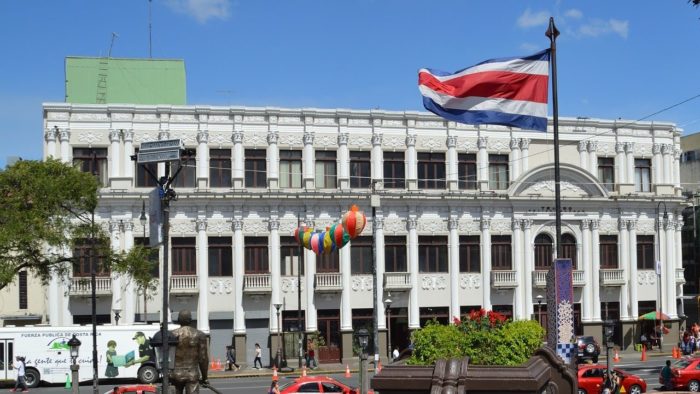
Costa Rica is a small country in Central America. It’s a popular expat destination, especially for retirees.
The cost of living within Costa Rica differs, though. If you live in an upscale gated community by the beach, your cost of living will be high. But if you live in a coffee growing region in the mountains, it’ll be a lot lower.
Find out more: Cost of Living in Costa Rica: How Much Do You Need Per Month?
Costa Rica attracts thousands of migrant workers from other Central American and Caribbean nations. Even so, high unemployment has been a national issue lately. Also, foreigners on temporary residence permits can’t work in Costa Rica.
So, it can be quite hard to find a job in Costa Rica as an expat. Nonetheless, many expats manage to find work at:
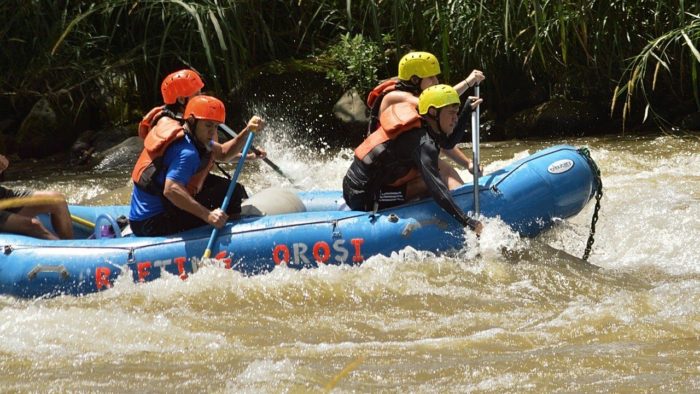
Expats find many advantages to working in Costa Rica. They get health insurance, worker’s compensation, fair wages, Christmas bonuses, and vacation days.
Tourism is one of the most important businesses in Costa Rica. However, there aren’t a lot of job opportunities for expats.
Expats who work for a foreign company do not need a work permit as long as their payments come from abroad.
Let’s say a freelance business consultant from Ohio moves to Playas del Coco in Guanacaste. If she works for online clients outside of Costa Rica, she won’t need a work permit, and she won’t be taxed on her income.
Let’s say she’s hired by an American bank and works from home in Costa Rica. She won’t need a work permit either.
Language teachers can find job listings on the Costa Rica section of Craigslist. LinkedIn usually yields good results, too. But the most comprehensive job database is ElEmpleo.com. There, you can narrow your search based on the languages you speak.
If your native language is English, you have an advantage in terms of jobs once you get a work permit or DIMEX card.
Spanish is the official language in Costa Rica. However, English is widely spoken in communities where North American and European expats settle.
The government has tried to turn Costa Rica into a bilingual nation. But the reality is that Spanish continues to be the most predominant language.
English is widely spoken in tourist and expat areas like Jaco Beach, Tamarindo, and parts of Quepos. But you won’t hear it beyond these areas with one exception — Limon on the Caribbean coast. Also, Afro-Caribbean residents with Jamaican ancestry speak Mekatelyu, also known as Lemonese Creole.
Younger ticos have become more fluent in Spanglish (Spanish and English). This is due to language education and the influence of American and Mexican television. However, Spanish reigns supreme.
After about a year of living in Costa Rica, many expats feel comfortable with Spanglish. But your best bet will be to learn Spanish. You shouldn’t have any problems finding language centers or expat learning clubs.
Children and residents over the age of 65 enjoy free healthcare in Costa Rica. They get it through the Caja Costarricense de Seguro Social. It’s a national system supported by a universal healthcare scheme.
The easiest way to enroll in this system is through an employer.
In this case, you need a work permit or DIMEX residency card. Then you have to contribute into the universal scheme with deductions that start at about US$12 per month. But payments depend on your salary. This contribution to La Caja includes not only healthcare, but the national retirement system too.
Costa Rica’s public healthcare system is like Health Canada and the Veterans Administration in the U.S. This means that it’s as good as it can afford to be. La Caja won’t let you down in terms of healthcare. But the system has been overwhelmed for years. It never turns anyone down for treatment, whether they are insured or not. So, this results in long lines and reduced quality of care.
Many expats prefer to enroll with the Instituto Nacional de Seguros (INS). This is a state-sponsored insurance company that offers comprehensive coverage for reasonable rates. For example, a policy for a woman in her 60s may cost about US$2,500 per year. It would feature very low deductibles in exchange for care at premium private hospitals. These are the same hospitals where medical tourists from the U.S. often travel.
Local clinics and neighborhood pharmacies are options that many ticos and expats also prefer. They get to skip the long lines and bureaucracy. And the cost of treatment is inexpensive, particularly with regard to prescriptions.
One word of advice, though. Clinics in expat communities tend to hire English-speaking physicians and medical workers. However, they often charge more for this service.
On the other hand, many physicians here study and practice in western English-speaking countries. So, they should be able to communicate with foreign patients.
Read more:
It’s relatively easy for expats from the U.S., Canada, and EU to get visas. The same goes for Australia and G20 member nations with good diplomatic relations with Costa Rica.
The main visa categories include:
Tourists from the aforementioned countries get three-month visas at the port of entry and without prior request.
You can extend this visa by leaving the country and coming back after a few days. But doing so only prolongs your status as a non-resident. It’s generally better to request a formal extension. This is especially true if you visit as a journalist, for business purposes, or for medical treatment.
This category is quite popular with the following expats who:
If you regularly deposit money into a Costa Rica bank account, you can change your tourist visa into temporary residency. Then you can become a naturalized citizen after a few years.
You can find information about other visa categories on the Embassy of Costa Rica website. These list the visa requirements for:
Read more:
Costa Rica is not a large country; you can fit its territory 3.5 times into the state of Florida. About half of the country consists of nature preserves, but you can still find low density regions to accommodate five million residents, of which nearly a million are expats, primarily from Nicaragua.
The following cities and communities are among the most popular for North American and European expats:
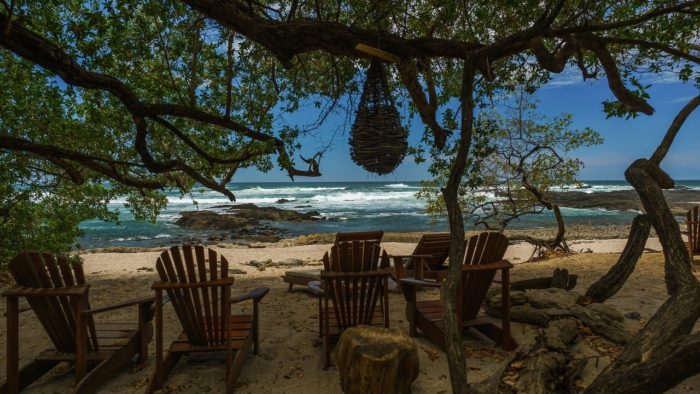
This northern province borders Nicaragua, and it is home to many paradisiacal beaches that get overrun with tourists during the high season. Tamarindo Beach, Playas del Coco, and the Gulf of Papagayo are filled with upscale beach resorts and gated communities where wealthier expats tend to flock.
These expat towns are not known for being affordable, but they are gorgeous places to live, especially if you are an avid golf player who also enjoys the beach.
This large region of Costa Rica is home to the Great Metropolitan Area of San Jose, a very populous region considered to be the most cosmopolitan in the country.
Communities such as Escazu and Santa Ana have modern and upscale neighborhoods where you can find stylish shopping malls and commercial strips that resemble suburban California. Depending on the district, the cost of living is often higher than in Guanacaste, and is typically the highest in the country.
In the outskirts of the Juan Santamaria International Airport, which is next to the city of Alajuela and northwest of San Jose, quite a few upper middle class neighborhoods have been developed since 2010. For the time being, the majority of home buyers and renters are tico families, but some expats are beginning to discover them.
If you are willing to move a bit farther away to the west, you will find expats who have found towns such as Atenas, Grecia, and Sarchi to be more laid-back and far more affordable. Moving to these towns will put you closer to the edge of the Central Valley, which means that you will be about 40 to 60 minutes away from the capital, but the weather and the atmosphere will be worth it.
As long as you are prepared to integrate with the locals, you will likely enjoy moving to these semi-rural towns.
This coastal town is for serious surfers and for expats who prefer speaking English and partying at American-style bars and casinos.
Many residents lament that this is no longer a family-friendly beach town, and they also feel that it is starting to resemble Long Beach in California; however, there are quite a few spectacular beach mansions in the area, including one owned by legendary NFL quarterback Tom Brady.
Once you head south of Jaco Beach, you will find amazing beach towns such as Dominical, Uvita, Ojochal, and Quepos. Ecotourism and offshore fishing are the main drivers of the local economy; this is a place where you can enjoy activities such as hiking, ocean kayaking, whale watching, and many others.
Life is good in these towns, although it can also feel a bit isolated until you head east about 40 kilometers to Perez Zeledon and San Isidro, two communities where smart expats enjoy more suburban convenience at lower prices.
The Caribbean coast of Costa Rica has a different flavor. Life is slower, the climate is more humid, and the locals are livelier. The port city of Limon welcomes cruise ship travelers as well as maritime trade; to the south, the more remote towns of Cahuita and Puerto Viejo are where expats who enjoy a more bohemian lifestyle have settled.
You are bound to find more Canadian and European expats here when compared to the rest of the country.
About half of the communities in Costa Rica can be described as rural towns; some are small cities in the mountains while others are not that far from the coast or national parks. These towns are home to families who work the land, but they will always welcome expats looking for a very quiet lifestyle.
Coffee growing regions near the Poas Volcano, where Starbucks has its own hacienda and farm, are very charming and quite affordable. Naranjo is not far from Sarchi, and it excels in coffee production. Coronado has quite a few dairy farms and a climate that is never too hot nor cold. Turrialba offers everything from potatoes to dairy and from coffee to tropical fruits.
San Vito, near the border with Panama, has traditionally attracted Italian expats, and this is a place where even a modest income can be comfortably stretched.
You should have an easy time finding something to rent in Costa Rica. Whether it’s a studio apartment, a multi-room house, or beachside villa, the country has it all.
It is estimated that 20% of the housing market in Costa Rica is dedicated to rental properties; this percentage used to be considerably lower a few decades ago because ticos tend to hold on to family homes, and they generally dislike having to pay rent if they can avoid it by staying with relatives. But this does not mean you won’t be able to find a nice place to rent at a reasonable price.
The influx of expats is one of the reasons the rental market has expanded in Costa Rica. Landlords know that their properties are located in a desirable nation, and they think they have a better chance of increasing their lease revenues with foreign tenants.
With this in mind, some expats believe that Costa Rica is the most expensive rental market in the Americas, but this applies to families who earn median incomes, which happen to be very low.
In Costa Rica, you can rent a one-bedroom apartment for less than US$600, but definitely not in a gated beachfront community or in a trendy neighborhood in the hills overlooking downtown San Jose.
If you play your cards right, you can find three-bedroom homes with generous living space and large backyards in semi-rural areas for as low as US$250 a month.
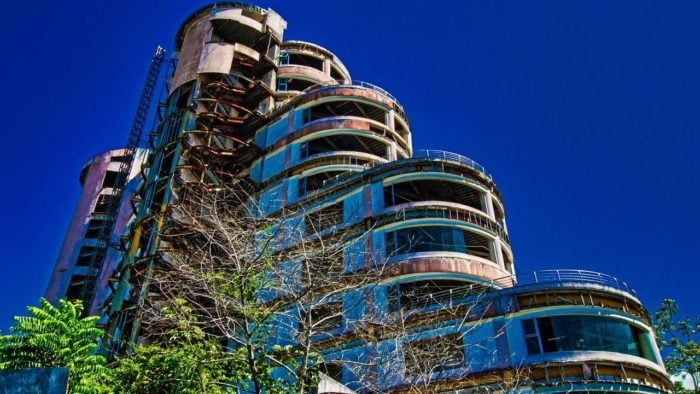
Moving into an expat community in Costa Rica will almost guarantee you will pay at least twice as much as the median monthly rent, and perhaps maybe more.
For example, in an expat community in Tamarindo, you’ll pay around US$2,500 for a three-bedroom house.
Dealing with a real estate broker who caters to expats is a one-way ticket to paying a more expensive lease contract. Your best bet is to look for properties listed on online classified platforms such as Encuentra24 and Mercado Libre, but if you see listings written in English or offered in U.S. dollars, this is a clear sign that they are seeking expat tenants, which usually means a higher monthly rent.
Read more:
Leases in Costa Rica are subject to the oversight of Public Law 7527, which grants more rights to tenants than counterpart laws in jurisdictions such as the U.S. Verbal contracts are difficult to defend or litigate in court, and this is why you will want them written in Spanish and stamped by a notary public.
If the monthly rate is to be paid in dollars, euros, or any other foreign currency other than the Costa Rica colón, the landlord will not be able to raise the rent unless a new contract is executed.
Annual increases are limited to the national inflation rate. Tenants are automatically granted 7 calendar days from the agreed payment date to satisfy their monthly obligation without incurring late fees.
Rental agreements are valid for 3 years, but they can be broken by tenants with a written notification presented a month in advance. Conversely, landlords can break the lease with written notice delivered 3 months in advance, which means that the length of contracts is pretty much open.
If you tell a landlord that you will only stay for a couple of months, the contract can be executed for that term, but there will be no need to renew it because the law provides for tacit extensions. As long as you notify the landlord, preferably in writing, that you will be leaving one month in advance, the lease can be legally broken anytime.
Deposit payments are customary but optional; they are usually charged at the rate of one month, and some landlords will accept 50% upfront and the rest of the deposit to be paid at a later time, usually in the second month.
The payment of utilities can be included in the monthly rent fees if so desired; otherwise, it is up to tenants to make payments in the name of the landlord, and these services can be paid in multiple locations that range from banks to supermarkets and even drugstores.
Under Public Law 7527, property owners are expected to pay for water and electricity services billed under their names, but they also have the right to defer payment to tenants.
The responsibility of keeping these utilities turned on is shared between landlords and tenants. This means that you should notify the landlord if you are not able to pay in order to avoid disconnection.
Landlords cannot order utilities to be turned off for any reason as long as tenants occupy their properties.
Since the country mostly runs on hydroelectric power, electricity rates are expensive when compared to other countries in the Americas; they are particularly comparable to the rates paid in Italy. With this in mind, you should know that operating an air conditioning unit in Costa Rica can be expensive; thankfully, the mild climate in most of the country means that you can live without A/C.
In the Great Metropolitan Area of Costa Rica, the main water utility uses pumps to distribute water, and this creates a problem during drought periods or after major earthquakes. In smaller communities where water tanks and gravity systems are used, residents enjoy abundant pressure and much lower rates.
Most cable television providers also offer unlimited broadband internet service through coaxial cable or fiber optic networks. Some satellite TV providers offer wireless broadband service, but speeds may be capped because they use legacy 4G networks, so your best bet will always be fiber optic for residential use.
To give you an idea of the monthly costs, you should expect to pay around US$160 for water, electricity, and garbage collection, and US$70 for 112 cable channels that include a handful of premium sports and movie stations along with 200 Mbps broadband.
Banks in Costa Rica fall under two major categories: State-sponsored and private. The Big Three banks are state-sponsored and provide unlimited deposit insurance in case of default or failure; they are Banco Nacional, Banco de Costa Rica, and Banco Popular.
Banco Popular is unique in the sense that it is the only one where your funds cannot be turned over to third parties even if they have a court order, unless it is for the purpose of paying child support.
Private banks tend to charge more fees and are often associated with foreign institutions; for example, Scotiabank has a loose partnership with its Canadian namesake but mostly for branding purposes.
If you have a Scotiabank account that you opened in Vancouver, don’t expect to be able to simply transfer it over to a branch in Costa Rica, although you may save on foreign ATM fees. Your deposits are not backed or guaranteed at private banks.
Personal banking in Costa Rica is quite efficient and affordable, but opening an account can be a bit of a headache for expats who are not residents or who do not have a work permit.
Once you have a DIMEX card, the residency identification document sometimes called “cédula de extranjería,” opening a bank account is as easy as walking up to the customer service counter of any branch and requesting it.
If you only have a work permit, some banks will allow you to open an account, but others will not. The same goes for expats who only have passports; some banks will accept this form of ID as long as it is valid and stamped with a current visa, but others will not.
The lack of consistency with regard to opening banks with just passports or work permits in Costa Rica is frustrating. You may be told by a bank employee over the phone that you can open a simple savings account with just a passport, a local address, and a mobile phone number, but you may be told otherwise when you get to the bank to do so.
When this happens, you can try going to another branch office of the same bank and things will be different. A bank that denies your application today may accept it a week later; unfortunately, this is the way many things work in Costa Rica.
For some expats, a better option is to establish a Costa Rican business entity, which can be as simple as a personal trust or as complex as a corporation. The bottom line is that you get a “cédula jurídica” that allows you to get a commercial bank account that works like a personal one.
As a business entity, there are many things expats can do before they become residents; they can purchase real estate, vehicles, establish commercial operations, and conduct investment transactions. Registering as a business entity in Costa Rica is something you can do with a local law firm.
Once your Costa Rica bank account is open, you will find it convenient and easy to use. You can send money here. Paper checks have been a thing of the past for decades; everything is handled via mobile app and ATM transactions.
A personal savings account does not charge fees outside of US$10 per year for debit card use. Intra-bank transfers are instant and free of charge. Online and mobile banking security is enhanced with two-factor authentication as well as physical tokens.
Read more:
“More teachers than soldiers” is the unofficial motto of Costa Rica, a country that takes pride in having abolished its army in exchange for a solid educational system.
Free public schools are everywhere; they provide one or two meals per school day in addition to immunization and dental cleaning services.
Many expats send their children to private schools because of the language teaching aspect; the English taught at most primary and secondary public schools is not sufficient for career purposes. Some public high schools have strong bilingual education curricula, but the merit-based admission system can be limiting.

Compared to many other countries in the Americas, private school tuition in Costa Rica is very affordable, and the quality of education is high.
Public universities in Costa Rica are often ranked along with the best of Latin America; foreign students who manage to gain admission to these schools will find tuition rates to be very reasonable, particularly for scientific programs.
There are quite a few private colleges and universities around the country, but the quality of their programs pales in comparison to their public counterparts; the only exception would be the Instituto Centroamericano de Administración de Empresas (INCAE), which adheres to Harvard Business School curricula and methodology, and which the Wall Street Journal places as one of the top MBA programs in the world.
Read more:
You can make up to US$1,881 in personal monthly income generated from wages or business activity without having to worry about paying taxes; this is based on currency exchange rates in 2024, and most working ticos do not earn that much.
Below is a list of personal income tax in Costa Rica.
| Income | Tax Rate |
| US$1,881 to US$2,760 | 10% |
| US$2,761 to US$4,834 | 15% |
| US$4,835 to US$9,684 | 20% |
| over US$9,685 | 25% |
As previously mentioned, income earned in other countries is never taxed. Naturally, taxpayers get standard deductions based on their dependent spouses and children.
Taxes are pretty high on certain imports, particularly vehicles and some electronics, which you can expect to be assessed with rates starting at 13%.
Since 2019, Costa Rica has implemented a value-added tax system that ranges between 10-13% for most goods and services. Some stores and service providers include this VAT on their prices and fees because they are in charge of remitting them to the revenue collection agency. In 2020, a 1% sales tax went into effect for most supermarket items, but there were strong calls for its postponement because of the coronavirus pandemic.
Property taxes and real estate transfer fees are pretty reasonable, and they can be reduced when the transactions are conducted through business entities.
Read more: A Beginner’s Guide to Costa Rican Tax for US Expats
Some expats who have traveled to Mexico and Puerto Rico will tell you that Costa Rica is even more Americanized, but this is true only to a certain extent. If you are familiar with Latin American culture, you will have no problem adjusting to life in Costa Rica.
Ticos are known to be very friendly and non-confrontational; they tend to welcome foreigners because they associate them with the tourism industry.
As in any other country in the world, ticos will be more appreciative of expats who make an effort to learn Spanish and assimilate, but they are never judgmental about those who never get around to learning the language.
For the most part, Costa Rican society is conservative by virtue of the Roman Catholic religion, which is the constitutional faith of the country. Nonetheless, an Evangelical Protestant movement with even more conservative views has been taking hold in recent years.
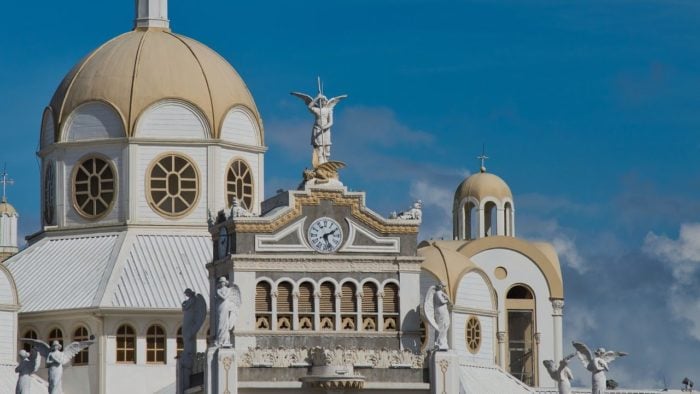
Family comes first in Costa Rica, and this includes non-relatives who forge strong bonds with locals. Expats who marry local residents should not be concerned about being accepted into the family as long as they are willing to be accepted.
For the most part, ticos feel closer to expats from the Americas and Europe, more so than from Africa and Asia.
The Latin American ethos of having fun and enjoying life is quite strong in Costa Rica. Taking things easy is a national philosophy that some expats may find uncomfortable in the beginning; for example, you may set an appointment for a cable service installation at your home at 10:00 in the morning, but the technicians may arrive at 2:00 in the afternoon without notice and with an amusing apology.
This is the way things have worked in Costa Rica for more than two centuries, and they are not likely to change.
Expats will find that Costa Rica offers cultural activities aplenty. Museums, art galleries, theaters, cinemas, cafes, pubs, dance halls, discos, shops, restaurants, and many other entertainment venues can be found across the country.
Since this is a country where beautiful destinations beg to be discovered, you will find many opportunities to tour beaches, mountains, rivers, national parks, lakes, active volcanoes, cloud forests, rain forests, lagoons, and many other natural treasures. Going away for the weekend and getting lost in a small rural town are among the many pastimes ticos appreciate along with football and surfing.
You should not have a problem adjusting to life in Costa Rica; once you get past the societal laissez faire attitude, you will come to embrace it. Naturally, you can gradually ease into this life by spending time with your fellow expats, but you will not want to miss out on opportunities to fully integrate.
There are exactly 8 ports of entry in Costa Rica: 2 terrestrial checkpoints along Nicaragua, 2 along Panama, a cruise port in the Caribbean, another one in the Pacific, and 2 international airports.
Although the Tobias Bolaños Executive Airport in San Jose can also accommodate international arrivals, it is rarely used by expats.
Landing at the Daniel Oduber Quiros International Airport in Guanacaste will invariably cost more than doing so at the Juan Santamaria International Airport (SJO) just outside of the capital city.
For most expats, it will make more sense to land at SJO because it is more affordable and offers more connections to other points of the country.

With regard to landing at the Guanacaste Airport, you may be able to find seasonal fare deals to make it more affordable, but they may not compete against SJO. Costa Rica has not operated a flagship air carrier for years; for this reason, you are more likely to arrive on a flight operated by a carrier from the United States or Canada.
Direct flights from Europe typically take off from Barajas International Airport in Madrid, but there are some seasonal options from London, Paris, and Frankfurt.
There aren’t many domestic flights because this is a small country, but the ones that depart from the main airport are incredibly cheap and will get you to any destination in about 30 minutes. A one-way flight from San Jose to the beaches of Guanacaste will cost less than US$100; some of these are sightseeing flights aboard small propeller aircraft equipped with panoramic windows.
Assuming that the ultimate goal of visiting Costa Rica is to become a temporary resident and perhaps a permanent expat, you should bring more than just your passport. Be sure to carry all forms of identification from your home country, particularly numbered cards issued by a national or regional agency. For example, United States citizens or residents should bring social security cards and driver’s licenses.
If you intend to drive in Costa Rica, an international driving permit will cover you for 3 months; after that, you will have to get a local driver’s license.
Get a police background check from the country where you have legally resided for the last 3 years, and make sure it has been stamped with the apostille convention. This will be a hard requirement when you apply for a temporary resident visa, and it will be easier to get before you leave.
Other documents that are useful to certify with apostille prior to your departure include:
Make sure you carry original documents as well as photocopies; needless to say, you should also scan digital copies and keep them in secure digital storage, which can be an encrypted USB drive or cloud folder.
Bring all prescription medications along with the slip issued by your doctor. You will likely be able to fill a prescription here at a local pharmacy with just a quick medical evaluation, which will probably be free or at very low cost.
Many expats, particularly those who move here from North America, choose to bring larger personal items that do not fit in their checked luggage, and there are valid reasons for doing so.
First of all, if you have top-of-the-line home appliances such as smart refrigerators, electric stoves, combination washer/dryers, wine chillers, and home theater systems, you may not be able to find them here. Even if you do, you will end up paying significantly more with the import surcharge and VAT.

When you evaluate shipping costs and import taxes, you will find that they are often more reasonable than having to buy everything from scratch. Anything that was expensive in the United States, for example, will be far more expensive here.
Naturally, you can always start over and shop for furniture and appliances here, which can be quite affordable if you do not mind modest functionality. High-end items will cost you more and are harder to find.
It is not unusual for expats to ship vehicles, motorcycles, appliances, electronics, personal items, tools, and even supplies to Costa Rica.
If your possessions can be shipped in a maritime container, it will likely arrive in the ports of Limon or Paquera. Items can be shipped from here to the central customs facilities for secondary inspection and taxation if needed. Once the items have been released, they can be transported to your new home in Costa Rica.
Your best bet will always be to work with movers in Costa Rica that work with international partners. As you might imagine, there is no shortage of these partners in the United States, but you can also find them in many other countries. The key is to find the right international shipping company that can work with customs agents in Costa Rica.
A good strategy in this regard is to get various quotes from experienced companies. It is important to compare the various services offered because not all companies will offer door-to-door service.
As for the matter of handling your items within the country, you will be surprised at the professional services provided by tico movers once the items are released from customs. They can easily deliver even to the most remote spots of the country the same day they pick up shipments.
Find out more: Shipping to Costa Rica: Procedure, Costs, and Customs
The first step you should take is to determine the kind of entry visa your passport will grant you. If you are in the group of countries that do not require a visa application to come here for 3 months, you will also be able to easily extend it for another 3 months without having to leave the country.
Assuming that your request for a temporary residency visa is accepted on the basis that you have at least US$2,500 in monthly income while you stay here, or that you will marry a Costa Rican citizen, or that you have an ambitious business investment plan to execute, the Directorate of Immigration will have 90 days to issue a decision, but this is not written in stone and may take longer.
Even if you are working with a local law firm, you may have to wait longer than 6 months, but you will be able to obtain visa extensions in the meantime.
With all the above in mind, you cannot set a firm timeline for planning your move. Rather, you will need to be flexible because you may be waiting on an adjudication from the Directorate of Immigration for months.
A law firm may be able to give you estimates based on insider knowledge or even special favors that seasoned lawyers can cash in with immigration case reviewers, but flexibility will still be key.
Let’s say you meet either of the two major requirements for a residency application:
When you arrive here as a tourist, you can deposit US$200 in the bank account managed by the Directorate of Immigration, submit your application, and hope to be approved in 3 months. In the meantime, you can choose to stay here or return home, but you will still have to wait.
Getting an approval within the 90 days suggested by the Directorate would be rare and surprising, so a good rule of thumb is to give yourself at least 3 months to put your affairs in order.
Actually renting a place, activating the utilities, enrolling the kids in school, getting insurance or signing up for La Caja will only take you a couple of days to accomplish. As for moving personal property, equipment, or vehicles into Costa Rica, you should check with the movers. In some cases, shipping a maritime container may only take about a week.
It is estimated that 10% of the population in Costa Rica are expats who have permanently relocated here. Another 10% are foreigners who go back and forth from their countries as migrant workers, seasonal visitors, or renew their tourism visa a couple of times each year.
Costa Rica is a fantastic place to visit, and it can also be great as your next home. Dust off your passport and make sure it will remain valid through your stay; head down here as a visitor and get a feel for the country.
If you need more time, extend your visa and look into a temporary rental away from the popular tourism destinations so that you can experience what living here would be like. Chances are that you’ll soon be making plans for a permanent move to Costa Rica.
Here are some of the most important guides you must read when moving to Costa Rica:
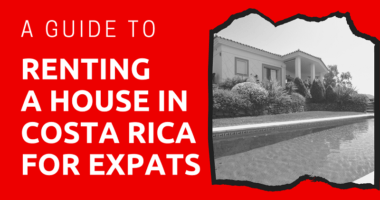 A Guide to Renting a House in Costa Rica for Expats 2024-03-14 In Costa Rica, there are many different types of properties suitable for expats to rent. The most expensive ones can… ... Read more
A Guide to Renting a House in Costa Rica for Expats 2024-03-14 In Costa Rica, there are many different types of properties suitable for expats to rent. The most expensive ones can… ... Read more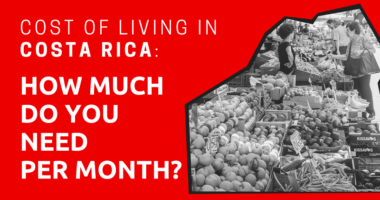 Cost of Living in Costa Rica: How Much Do You Need Per Month? (2024) 2024-03-07 Here's how much you'll you spend per month in one of Central America's most popular expat destinations. ... Read more
Cost of Living in Costa Rica: How Much Do You Need Per Month? (2024) 2024-03-07 Here's how much you'll you spend per month in one of Central America's most popular expat destinations. ... Read more The Complete Guide to Finding an Apartment for Rent in Costa Rica as Expats 2023-08-22 Whether you plan on renting a house or an apartment while living in Costa Rica, it's always easier to find… ... Read more
The Complete Guide to Finding an Apartment for Rent in Costa Rica as Expats 2023-08-22 Whether you plan on renting a house or an apartment while living in Costa Rica, it's always easier to find… ... Read more Health Insurance for Expats in Costa Rica: What You Need to Know in 2024 2024-02-06 Health insurance is often one of the first things you think about when moving to a new country. Costa Rica… ... Read more
Health Insurance for Expats in Costa Rica: What You Need to Know in 2024 2024-02-06 Health insurance is often one of the first things you think about when moving to a new country. Costa Rica… ... Read more A Guide to the Cheapest Way to Send Money to Costa Rica 2024-03-04 There was a time when sending money to Costa Rica was not easy. Despite forging historically close ties with the… ... Read more
A Guide to the Cheapest Way to Send Money to Costa Rica 2024-03-04 There was a time when sending money to Costa Rica was not easy. Despite forging historically close ties with the… ... Read more Shipping to Costa Rica: Procedure, Costs, and Customs 2023-08-23 Are you shipping a parcel to Costa Rica? Are you planning to move there and need to ship some of… ... Read more
Shipping to Costa Rica: Procedure, Costs, and Customs 2023-08-23 Are you shipping a parcel to Costa Rica? Are you planning to move there and need to ship some of… ... Read more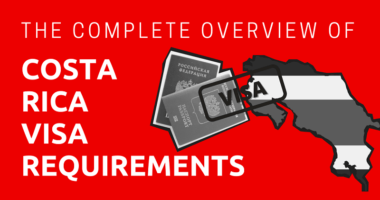 A Complete Overview of Costa Rica’s Visa Requirements 2024-04-25 How to get the right visa for your situation and stay in the country either short or long term. ... Read more
A Complete Overview of Costa Rica’s Visa Requirements 2024-04-25 How to get the right visa for your situation and stay in the country either short or long term. ... Read more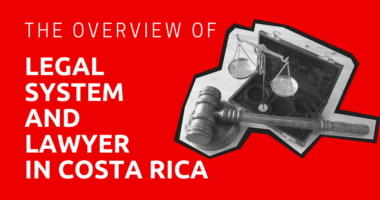 An Overview of the Legal System and Lawyers in Costa Rica 2024-04-17 Unless you have spent time looking into it, it’s fair to assume you might not be overly familiar with the… ... Read more
An Overview of the Legal System and Lawyers in Costa Rica 2024-04-17 Unless you have spent time looking into it, it’s fair to assume you might not be overly familiar with the… ... Read more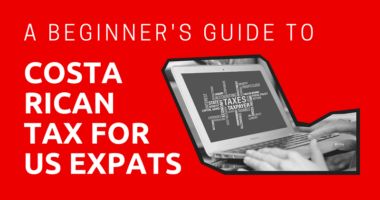 A Beginner’s Guide to Costa Rican Tax for US Expats 2023-08-11 Find out if you have to file income taxes as an American expat living in Costa Rica. ... Read more
A Beginner’s Guide to Costa Rican Tax for US Expats 2023-08-11 Find out if you have to file income taxes as an American expat living in Costa Rica. ... Read moreFind common topics that will help you overcome the challenges of living, working, retiring, and starting businesses in Costa Rica.
Unlike in many other countries, being an expatriate in Costa Rica does not offer a wide variety of online dating options. Previously, dating sites in … Read more
San Jose is the capital city of Costa Rica. It’s one of the most popular destinations for expats moving here. The city has every facility … Read more
Dental implants are a great option for those in need of teeth replacement. They provide a strong foundation for new teeth and stimulate bone growth … Read more
To fully explore fascinating landscapes and unseen spots in Costa Rica, you should drive a car here. Driving in Costa Rica can be challenging if … Read more
How to pick the right primary, secondary, or higher education school for you or your family.
With more and more retirees choosing to retire abroad, Costa Rica took notice and poised itself as a prime retirement destination. It continues to attract … Read more
If you currently call Costa Rica your home, or you’re interested in coming here to get dental work done, you might be surprised to know … Read more
If you’re traveling to Costa Rica, you might find it necessary to rent a car. That way, you can go to different locations that aren’t … Read more
Protect your online presence in Costa Rica with a safe and private VPN.
Expats in Costa Rica are entitled to some healthcare benefits similar to those enjoyed by residents. This is part of the country’s efforts to continuously … Read more
Costa Rica is the only Latin American democratic country without the need of an army — meaning it’s very peaceful. But expats relocate here for … Read more
Thinking of retiring in the country? Check out these top expat locations.